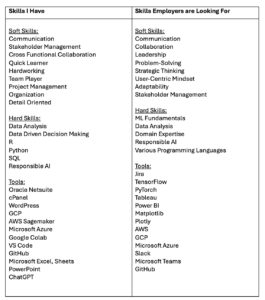Changing careers is never easy. I knew it would be a bumpy road when I decided to transition into a career in artificial intelligence. My background wasn’t originally in tech, but the potential of AI, its impact across industries, and its ability to reshape the future fascinated me. Being at HBS and meeting people in the space showed me that I wanted to be a part of the change. However, my initial excitement was regularly challenged by the reality that a career transition into AI comes with its challenges.
In this post, I want to share my experience, my struggles, and the strategies I’m using to land a job in AI. If you’re thinking about making a similar move, I hope this can provide some honest insight and helpful advice.
Identifying Gaps in Skills and Experience
One of the first obstacles I faced was realizing how much I didn’t know. It’s not just about understanding AI on a surface level. The field requires a deep understanding of machine learning, data science, and domain-specific knowledge. I don’t come from a technical background, so filling the gap between where I am and where I need to be seems daunting. Luckily, a few roles prioritize business experience, and those are the ones I am aiming for.
I started this process by assessing the skills I needed to acquire. I could create a focused learning plan with a list of skills I wanted to develop. The goal is to build a suitable skill set and craft a clear narrative regarding my skills and experiences to share with potential employers.

Dealing with Uncertainty
One of the hardest parts of switching to AI—or any new field, really—is the feeling of not belonging. When times were tough, I questioned whether I could succeed in AI or if I was out of my depth. This feeling of uncertainty found its way into my head even when doing mundane day-to-day tasks. It’s in my head now.
I remind myself these feelings are normal, but I shouldn’t let them consume me. I learned to push through the discomfort by focusing on my progress rather than comparing myself to others. AI is rapidly evolving, so even seasoned professionals are constantly learning. Realizing that learning is a never-ending process helped me keep going.
Job Market Competition
Breaking into the AI job market is incredibly competitive. Not only are there more people interested in AI roles than ever before, but the current job market is also oversaturated with qualified tech PMs who are also looking for the same roles I am. Companies can be more selective with the candidates they want to hire and prioritize individuals with advanced degrees or years of experience in product management.
What I’ve learned is that perseverance is essential. The competition can be fierce, but rejection is a learning opportunity and a way to build character. Getting through this stage will require a combination of determination, learning, and creativity in how I approach the job search.
Developing a Strategy for Success
I’ve put a lot of energy into networking in my job search processes. While at Harvard, I attended AI conferences and joined AI communities to meet other passionate innovators and stay engaged with the AI space. LinkedIn became a tool for me to connect with professionals in the field, and I reached out to people whose work I admired.
Building relationships in the AI space is essential for job opportunities and staying up-to-date with the latest trends and tools. Many AI roles are filled through connections, so networking has been a significant part of my strategy.
Leveraging Past Experience
I’ve also learned to leverage my previous experience to my advantage. Even though my background wasn’t in AI, I had worked in areas that gave me transferable skills. As an AI product manager and researcher, I have developed skills relevant to data-driven roles. This helped me position myself as someone who brings a unique perspective to AI projects. I wasn’t just learning AI from scratch—I was building on a foundation of skills I had developed in previous roles.
Showcasing my Skills by Building an AI Portfolio
In addition to my past experiences, I wanted to continue to build skills relevant to an AI-specific career. Taking on independent projects was one of the most effective ways to demonstrate my capabilities. It wasn’t enough to list skills on my resume—I needed to show employers I could apply them. I started this blog to track what I have learned and showcase the new skills I’m developing.
Continuous Learning
AI constantly evolves, so even if you land an AI job, the learning doesn’t stop. Staying on top of industry trends and new technologies is critical. I’ve found that consistently learning, whether through courses, articles, or attending conferences, has helped me stay competitive. The field moves quickly, and adaptability is one of the most important skills you can have.
Switching to a career in AI is not easy, but it is worth it. In my search, I’ve experienced many ups and downs. I have my fair share of struggles, but I’ve come to learn to enjoy the process and find ways to keep myself busy and sharp in the midst of the search. My advice to anyone considering this path, myself included, is to be patient, stay curious, and keep learning. It’s a journey, and every step forward is progress.
If you’re on a similar path, feel free to reach out—I’d love to hear your experiences and chat about job search strategies.

